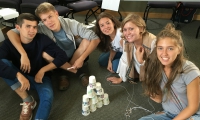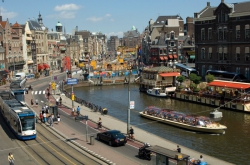What should a "green campus" be like?
The "green university" concept has been becoming more and more popular lately, and the world's leading universities (for instance, Oxford, Harvard, and the University of Singapore) have been practicing it for a long time already. The concept implies introducing courses on sustainable development, university redevelopment, and promoting ecological awareness to students and staff. Traditionally, "green" universities conduct their own eco-festivals and events, introduce separate waste collection and energy-conservation systems, and include programs on sustainable development into the curricula.
Projects on creating "green campuses" are conducted as part of a long-term program on promoting sustainable development. Two years ago, the General Assembly of the United Nations enacted the 2030 Agenda for Sustainable Development. The document stated 17 goals aimed at eradicating poverty, preserving the planet's resources and assuring everyone's well-being.
According to Jurgen Forkel-Schubert, representative of the Hamburg Ministry for Environment and Energy, Germany continues to work on integrating the concepts of sustainable development into all fields of society, education included. Sustainable development and environment protection programs are most successful in many universities - as both separate educational courses and projects on creating "green campuses" instigated by students.
At the international conference "Sustainable Development of Universities, Business and Cities in Russia and Germany" which took place as part of the German Week in St. Petersburg, representatives of German universities shared about how one can develop and carry out projects on sustainable development, as well as motivate students to participate in them.
University of Hamburg: Sustainable Development Days, CupChange and "clean trade"
In one of Germany's major academic centers, University of Hamburg, where more than 40,000 students study, the concept of sustainable development has been promoted since 2011. At that time, they launched a special center - Kompetenzzentrum Nachhaltige Universität, KNU, that focuses on integrating the concepts of sustainable development into educational programs and research, as well as supporting student projects and initiatives. As Kristina Shteker, the center's representative, notes, it is more like an incubator where lecturers, scientists and students experiment and select new approaches for creating a university that follows the concept of sustainable development.
 University of Hamburg
University of Hamburg
"We started with reorganizing the cafeteria, and then went on. As of now, the Center's work affects all of the university - from educational programs to student initiatives. We do a lot of projects proposed by students. If they pass the selection, they get financing, and can start working on their ideas. Also, we try to collaborate with other universities and representatives of different companies. During joint events, our students get the opportunity to question the representatives of business and discuss the problems that have to do with environment," shares Kristina Shtecker.
During the past years, they introduced 11 student initiatives, adds Mirko Sauvand, a Master's student from University of Hamburg. All of them started as small single projects. For instance, he and his peer once proposed doing their own "Eco-slam" - this event has now become traditional, much like the Sustainable Development Days. The students helped organize clothing exchange on campus; also, they instigated the "clean trade" concept - by using a special map, anyone could get information on places that sell well-tried quality products. Among other initiatives there's the CupChange project. So as to decrease the amount of litter from the canteen, the students proposed to stop using disposable cups. Instead, they promote bringing one's own: all who do that get a discount on coffee.
Free University of Berlin: solar panels and an on-site vegetable patch
Eight years ago, students from Free University of Berlin decided to place solar panels on the roof of one of the university’s buildings. They brought this initiative to the Sustainability and Energy Management Unit - starting with 2001, this unit worked on initiatives on energy conservation. Since then, not only did the university start conducting special Sustainable Development Days and public lectures on ecology, but even created its own vegetable patch and garden.
"We grow fruits and vegetables in a garden on the campus, and sometimes try really experimental things. For instance, we once planted everything according to the agricultural concepts that ancient Mayans used. And some years ago, we were presented with 13 thousand flower bulbs. With everyone’s help, we succeeded in planting them in two days only. We consume all we grow in our garden ourselves; last time, we gathered whole buckets of salad from our vegetable patch," shares Katrina Risch, manager of the University Alliance for Sustainability and representative of the Sustainability and Energy Management Unit of Free University of Berlin.
 Free University of Berlin
Free University of Berlin
According to her, all these activities are voluntary, and the students who work on the Sustain It project have equal rights and responsibilities. As of now, more than 2,000 students and university staff members actively participate in the project. Each year, they conduct more than 25 events - from eco-projects, festivals and performances to meetings with representatives of business and open lectures.
What about St. Petersburg?
St. Petersburg has its own network of "green" universities. It is an informal alliance of the city's universities that have students who are interested in developing ecological initiatives and introducing practices that aim to ease the burden on the environment. As of now, it unites eleven St. Petersburg universities.
Some of them have a system for separate waste collection - for instance, in Saint Petersburg State University it exists for several years already, all of the universities units collect wastepaper, comments Antonina Evteshina, representative of the university's Ecology Unit. What's more, the students regularly participate in voluntary work in the university's botanical garden, and each can even become a permanent "guardian" of a particular plant.

According to Roman Fattakhov, Master's student at ITMO's Institute of Design & Urban Studies, at ITMO University they've set up organized collection of used batteries, as well as conduct different events, including the traditional bicycle rides. Yet, there are to be even more initiatives, especially those aimed not only at the university, but whole districts of the city.
"As for the initiatives in our university, I believe that we should add collecting light bulbs from our facilities and dorms, - this is a relevant issue, and our colleagues from other universities already do that. Another interesting project we should develop is collecting clothing, I believe many students would respond to it, shares Roman. We also try cases focused on creating bike lanes and increasing the awareness to this problem. Recently, we worked on options for creating such an infrastructure on Vasilievsky Island, as one of our buildings is on the Birzhevaya str. In future, we plan to develop this initiative and hope to get support from the city's officials. And, surely, we would be happy to collaborate with our foreign colleagues."
Irina Shmeleva, Associate Professor at the Institute of Design & Urban Studies and head of the Institute of Sustainable Development Strategy non-profit organization, such collaboration is being gradually established. The first step to partnership was made a year ago, when representatives of Hamburg Ministry for Environment and Energy came to St. Petersburg.
 Irina Shmeleva (in the center) and the German delegation
Irina Shmeleva (in the center) and the German delegation
"Our next step will be participating in the "VyzEcoFest" [University Ecological Festival -- Ed.] program. It will start on April 17 and coincide with the Congress of Young Scientists of ITMO University. From April 18 to 20, the Institute of Design & Urban Studies with support from Friedrich Ebert Foundation and the Institute of Sustainable Development Strategy conducts an international workshop in which students from Free University of Berlin, HCU Hamburg, University of Hamburg and Gdańsk University of Technology will take part, shares Irina Shmeleva. Yet, I have to note that the idea of a "green campus" is more than just single projects like waste collection or flower planting. The main point is in organizing the life of a whole university in accordance with the concept of sustainable development. From this point of view, creating centers like those in Germany that supervise all the aspects from educational programs and research to project work and international cooperation can greatly help Russian universities break new grounds."
VyzEcoFest is an interuniversity festival in the field of sustainable development. Each April, universities unite to conduct dozens of ecological events. The festival's main idea is to give its participants an opportunity to influence their cities' development. What's more, as the festival's organizers from different universities collaborate, they get a chance to exchange experience and share best practices.
This year, students from eleven cities of the Russian Federation will take part in the event: Moscow, St. Petersburg, Krasnoyarsk, Yekaterinburg, Chelyabinsk, Stavropol, Rostov, Orel, Krasnodar, Belgorod and Perm.





